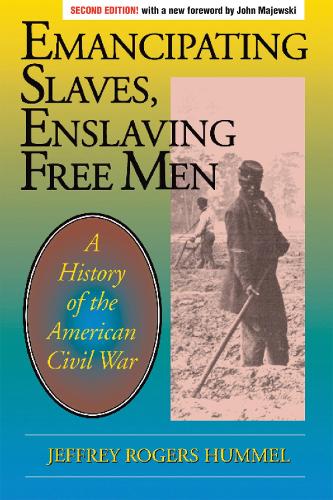
Emancipating Slaves, Enslaving Free Men: A History of the American Civil War
(Paperback, Second Edition)
Publishing Details
Emancipating Slaves, Enslaving Free Men: A History of the American Civil War
By (Author) Jeffrey Hummel
Foreword by John Majewski
Cricket Books, a division of Carus Publishing Co
Cricket Books, a division of Carus Publishing Co
18th March 2014
Second Edition
United States
Classifications
General
Non Fiction
973.7
Physical Properties
Paperback
448
Width 152mm, Height 228mm
609g
Description
This book combines a sweeping narrative of the Civil War with a bold new look at the wars significance for American society. Professor Hummel sees the Civil War as Americas turning point: simultaneously the culmination and repudiation of the American revolution.
Chapters tell the story of the Civil War, discussing the issues raised in readable prose, each followed by a detailed bibliographical essay, looking at the different major works on the subject with varying ideological viewpoints and conclusions.
In his economic analysis of slavery, Professor Hummel takes a different view. While some writers claim that slavery was unprofitable and harmful to the Southern economy, and others maintain it was profitable and efficient for the South, Hummel uses the economic concept of 'Deadweight Loss' to show that slavery was both highly profitable for slave owners and harmful to Southern economic development.
While highly critical of Confederate policy, Hummel argues that the war was fought to prevent secession, not to end slavery, and that preservation of the Union was not necessary to end slavery arguing that the South crucially relied on the Northern states to return runaway slaves to their owners.
Reviews
"With its insightful analysis (not to mention the extensive bibliographical essay that elaborates each chapter), Emancipating Slaves, Enslaving Free Men will supply both the academic and the Civil War buff with an added perspective on the causes and consequences of the Civil War." -- Publishers Weekly "Hummel ... presents some uncomfortable truths for both sides of the Civil War. For the South, Hummel builds a case that the war was indeed about slavery. For the North, he shows that a war to preserve the union was morally bankrupt and that freeing the slaves was the only justifiable reason for fighting. Yet Hummel demonstrates that even a war for such a noble cause was probably unnecessary, since slavery was politically doomed in an independent South. Hummel also illustrates some of the cost of the war, such as Lincoln's suppression of political opposition, the closing of dissenting newspapers, and the creation of big government under Republicans Lincoln, Johnson, and Grant. Here, Hummel steps on some toes." -- Library Journal "... a lucid, edifying account of the Civil War era. Mr. Hummel has an impressive command of the relevant contemporary literature. His interpretations are thoughtful, often provocative, always well worth considering. Civil War buffs will want this book on their shelves." -- Kenneth M. Stampp, author of The Peculiar Institution "Even veteran students of the conflict will find much to challenge their thinking in this forcefully argued and clearly written study." -- Gary W. Gallagher, Professor of American History, Penn State University
Author Bio
Jeffrey Rogers Hummel is Associate Professor of Economics at San Jose State University, where he teaches both economics and history. He lives in Walnut Creek, CA. John Majewski is Professor of History at the University of California Santa Barbara. He is author of Modernizing a Slave Economy: The Economic Vision of the Confederate Nation (University of North Carolina Press, 2009) and A House Divided: Economic Development in Pennsylvania and Virginia Before the Civil War (Cambridge University Press, 2000). He lives in Santa Barbara, CA.
